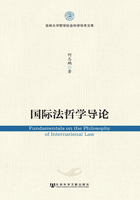
摘要
国际法哲学是国际法的基本理论、一般理论和方法论。国际法哲学的基本范畴涵盖了国际法的本体论、价值论、方法论、运行论。国际法的本体论是认识国际法的核心和起点,必须以国际关系的整体环境和法律的总体状态来论断。在辩证的维度上认识国际法是把握国际法宏观演进的关键,在不同国家立场辩证统一的基础上判定国际法价值是更加立体、全面地判断国际法状态的重要手段。通过在法学整体的知识体系和思维模式下认知国际法,通过在国际关系的系统格局和历史演进中去分析国际法,是妥当评价国际法的重要语境。由此可以对于国际法重要的前沿和热点问题展开追问与反思,如主权、有罪不罚、国际正义、遵行机制、国际社会契约。可以期待,以此种独特的中国视角探讨国际法问题,有望逐渐形成国际法的中国理论。
Abstract
Philosophy of international law, or jurisprudence of international law, is the basic theory, general theory, and methodology of international law. Categories of philosophy of international law covers ontology, axiology, methodology, and operation of international law. The ontology of international law is the core and start point of understanding international law, and should be interpreted in the overall status of international relations and law at large. To recognize international law in the aspect of dialectics is the key to grasp the innovation of international law, and to examine the values of international law in the sense of various stands by states is an important measure to know the status of international law. To evaluate international law in a proper way, it is necessary to employ the knowledge system of law as well as theories of international relations by a historical perspective. Based on such context, it is possible to make reflections on frontier and newly raised issues in international law, such as sovereignty, impunity, international justice, compliance, and international social contract. Such unique Chinese perspective may help the establishment of a Chinese theory of international law.